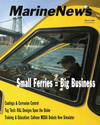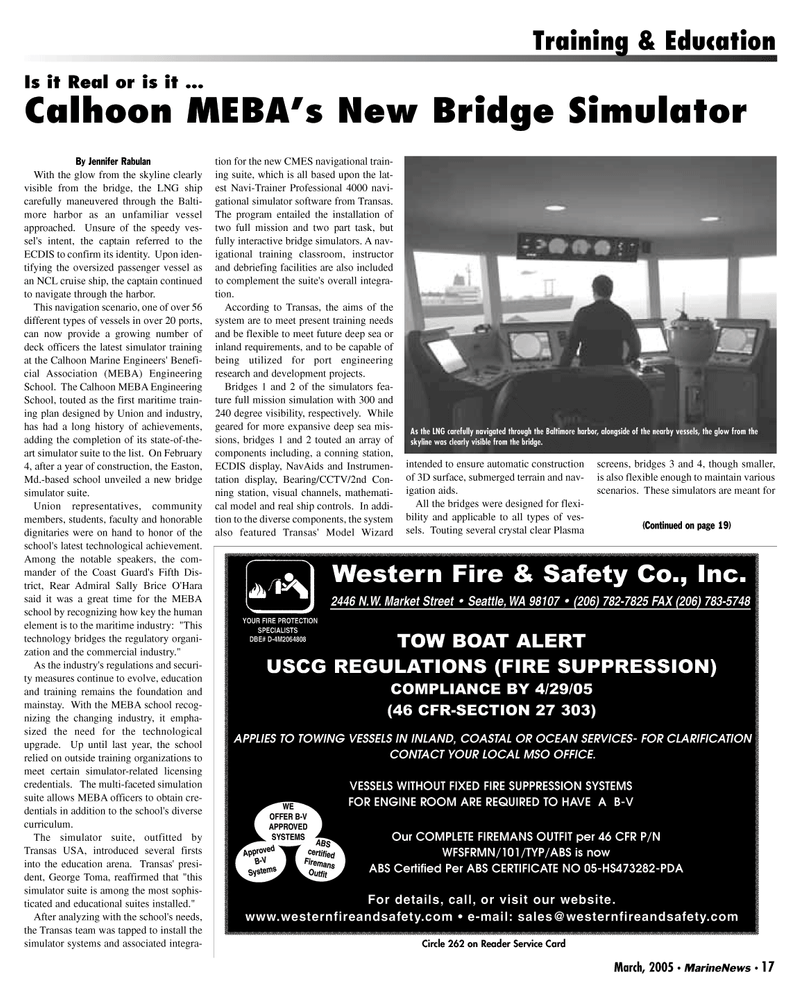
Page 17: of Marine News Magazine (March 2005)
Read this page in Pdf, Flash or Html5 edition of March 2005 Marine News Magazine
By Jennifer Rabulan
With the glow from the skyline clearly visible from the bridge, the LNG ship carefully maneuvered through the Balti- more harbor as an unfamiliar vessel approached. Unsure of the speedy ves- sel's intent, the captain referred to the
ECDIS to confirm its identity. Upon iden- tifying the oversized passenger vessel as an NCL cruise ship, the captain continued to navigate through the harbor.
This navigation scenario, one of over 56 different types of vessels in over 20 ports, can now provide a growing number of deck officers the latest simulator training at the Calhoon Marine Engineers' Benefi- cial Association (MEBA) Engineering
School. The Calhoon MEBA Engineering
School, touted as the first maritime train- ing plan designed by Union and industry, has had a long history of achievements, adding the completion of its state-of-the- art simulator suite to the list. On February 4, after a year of construction, the Easton,
Md.-based school unveiled a new bridge simulator suite.
Union representatives, community members, students, faculty and honorable dignitaries were on hand to honor of the school's latest technological achievement.
Among the notable speakers, the com- mander of the Coast Guard's Fifth Dis- trict, Rear Admiral Sally Brice O'Hara said it was a great time for the MEBA school by recognizing how key the human element is to the maritime industry: "This technology bridges the regulatory organi- zation and the commercial industry."
As the industry's regulations and securi- ty measures continue to evolve, education and training remains the foundation and mainstay. With the MEBA school recog- nizing the changing industry, it empha- sized the need for the technological upgrade. Up until last year, the school relied on outside training organizations to meet certain simulator-related licensing credentials. The multi-faceted simulation suite allows MEBA officers to obtain cre- dentials in addition to the school's diverse curriculum.
The simulator suite, outfitted by
Transas USA, introduced several firsts into the education arena. Transas' presi- dent, George Toma, reaffirmed that "this simulator suite is among the most sophis- ticated and educational suites installed."
After analyzing with the school's needs, the Transas team was tapped to install the simulator systems and associated integra- tion for the new CMES navigational train- ing suite, which is all based upon the lat- est Navi-Trainer Professional 4000 navi- gational simulator software from Transas.
The program entailed the installation of two full mission and two part task, but fully interactive bridge simulators. A nav- igational training classroom, instructor and debriefing facilities are also included to complement the suite's overall integra- tion.
According to Transas, the aims of the system are to meet present training needs and be flexible to meet future deep sea or inland requirements, and to be capable of being utilized for port engineering research and development projects.
Bridges 1 and 2 of the simulators fea- ture full mission simulation with 300 and 240 degree visibility, respectively. While geared for more expansive deep sea mis- sions, bridges 1 and 2 touted an array of components including, a conning station,
ECDIS display, NavAids and Instrumen- tation display, Bearing/CCTV/2nd Con- ning station, visual channels, mathemati- cal model and real ship controls. In addi- tion to the diverse components, the system also featured Transas' Model Wizard intended to ensure automatic construction of 3D surface, submerged terrain and nav- igation aids.
All the bridges were designed for flexi- bility and applicable to all types of ves- sels. Touting several crystal clear Plasma screens, bridges 3 and 4, though smaller, is also flexible enough to maintain various scenarios. These simulators are meant for
March, 2005 • MarineNews 17
Training & Education
Is it Real or is it ...
Calhoon MEBA’s New Bridge Simulator
Western Fire & Safety Co., Inc. 2446 N.W. Market Street • Seattle, WA 98107 • (206) 782-7825 FAX (206) 783-5748
TOW BOAT ALERT
USCG REGULATIONS (FIRE SUPPRESSION)
COMPLIANCE BY 4/29/05 (46 CFR-SECTION 27 303)
APPLIES TO TOWING VESSELS IN INLAND, COASTAL OR OCEAN SERVICES- FOR CLARIFICATION
CONTACT YOUR LOCAL MSO OFFICE.
For details, call, or visit our website. www.westernfireandsafety.com • e-mail: [email protected]
YYOUR FIRE PROTECTION
SPECIALISTS
DBE# D-4M2064808
WE
OFFER B-V
APPROVED
SYSTEMS
Appr oved
B-V
Systems
ABS cer tified
Firemans
Outfit
VESSELS WITHOUT FIXED FIRE SUPPRESSION SYSTEMS
FOR ENGINE ROOM ARE REQUIRED TO HAVE A B-V
Our COMPLETE FIREMANS OUTFIT per 46 CFR P/N
WFSFRMN/101/TYP/ABS is now
ABS Certified Per ABS CERTIFICATE NO 05-HS473282-PDA
Circle 262 on Reader Service Card
As the LNG carefully navigated through the Baltimore harbor, alongside of the nearby vessels, the glow from the skyline was clearly visible from the bridge. (Continued on page 19)
MN MARCH05 3(17-24).qxd 3/4/2005 11:06 AM Page 17

 16
16

 18
18
